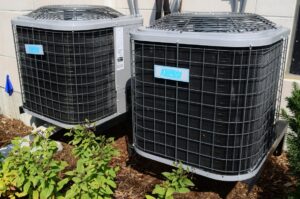Your air conditioner requires refrigerant in order to function. While your air conditioner certainly consumes electricity to operate, it actually doesn’t consume refrigerant. This may seem very counter-intuitive, but when you have an understanding of how refrigerant works, it will make much more sense as to why it isn’t consumed by your AC system.
Heat Transfer
The way air conditioners cool your home is by removing the heat and humidity and transferring it to the outside. The chemical that is used to transfer the heat is refrigerant. Refrigerant changes states easily from a gas to a liquid and back to a gas based on temperature. By manipulating the temperature of the refrigerant, you can absorb heat and release it, which are the key aspects of conditioning your home’s air. As such, the refrigerant in your system acts as a transfer agent, so it isn’t consumed. In fact, your air conditioner has to have an exact amount of refrigerant at all times to operate correctly; this amount is set by the manufacturer of your AC system. When the refrigerant runs low, typically due to a leak, the heat release/cooling process becomes imbalanced and affects your cooling.
So Why Do I Hear the Word “Recharge”?
Your air conditioner isn’t immune to leaks, and this is the main cause for refrigerant running low. Once your refrigerant level has dipped below the required amount needed for your system, it needs to be refilled, aka, recharged, to the amount specified for your system. Please note that a person has to be certified to handle refrigerant, which is one of the reasons you need to hire an expert to repair all refrigerant leaks.
If you have questions about how your system operates, or are experiencing issues related to your system’s refrigerant, call the experts at Celco Heating and Air Conditioning and schedule an appointment for your home in Westport, CT.






